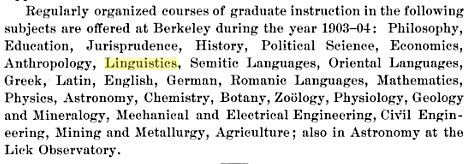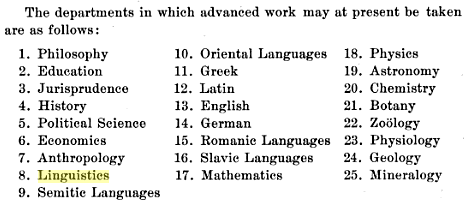Oldest linguistics department: research needed
« previous post | next post »
Uh-oh! A friend of mine who recently looked at the websites of the Departments of Linguistics at both the University of Chicago and the University of Pennsylvania just pointed out to me that each of them claims to be the oldest department of linguistics in the USA. This is bad. Language Log is headquartered on a server at Penn. Now we don't know whether our home is the oldest department of linguistics in the USA or not.
We need some research on this. I appeal to you, the readers. I want to know the real answer, but I want to get the research done on the cheap, by crowdsourcing. Please state what adminstrative definition of "department of linguistics" you are assuming, what evidence you are using, what dates are involved, what documents you are citing, and so on. Don't just say "Go Penn!" or "Yay Chicago" or whatever; this isn't about shallow boosterism. [Go Brown! Yay Edinburgh!] Anyway, age is distinct from beauty.
Comments are open, for a while. Make me proud.
RF said,
October 22, 2012 @ 8:41 pm
It seems the two claims are not precisely contradictory. UChicago claims to have the oldest linguistics department (est. "mid-1930's"), while Penn claims to have the oldest modern linguistics department (est. 1947).
If you're sufficiently flexible with your definition of "modern," this seems like a neat trick that could be applied more broadly. I myself, for example, am the oldest young person I know.
andrew said,
October 22, 2012 @ 8:51 pm
i have long puzzled at some information on my department's website (http://www.columbia.edu/cu/mesaas/info/history.html) claiming that Franz Boas established a "department of general and comparative linguistics" at columbia. Columbia had a linguistics department, I believe, since at least the late 1940s (no more, alas), but I haven't been able to confirm this information about Boas.
RF said,
October 22, 2012 @ 8:52 pm
One more wrinkle: Berkeley claims the "first linguistics department in North America," along with a founding date of 1901.
J.W. Brewer said,
October 22, 2012 @ 9:34 pm
"The situation at Yale, on the other hand, was quite different from that which obtained at Chicago. In the year that Sapir went to Yale (1931), the Department of Linguistics was set up, consisting of Sapir himself, and three eminent linguists already at Yale, namely, Professor Franklin Edgerton and the late Professors Eduard Prokosch and Edgar H. Sturtevant." This according to a 1953 piece by Mary Rosamond Haas included in a 1984 anthology about Sapir that I found on google books. The "quite different" point was that at Chicago grad students who wanted to do the sort of descriptive linguistics work on "primitive" tongues like Sapir was interested in needed to do it in the Anthropology Dep't rather than the Comparative Philology Dep't from which the modern department perhaps descends.
FWIW, when I was an undergraduate major in the Yale department in the mid-'80's I do not recall hearing any specific claims about the antiquity of the department-qua-department, much less a first-in-the-nation claim. The comparable claim of antique pedigree was rather that Yale had had the first _individual_ scholar at any U.S. college who from the standpoint of a century's hindsight would in the modern era likely have been slotted into a linguistics department (viz., the Sanskritist and comparative philologist William Dwight Whitney, who joined the faculty in . . . well, wikipedia says 1854, when "departments" in the modern sense really didn't exist).
Mark Liberman said,
October 22, 2012 @ 9:44 pm
The Register of the University of California for 1903-1904 has linguistics among the subjects with "Regularly organized courses of graduate instruction" (p. 49):

And in the "Revised Scheme of Undergraduate Work" (p. 99) it lists linguistics among "The departments in which advanced [i.e. Upper Division] work may at present be taken":

However, the faculty in Linguistics it lists (p. 160) all are given titles indicating an appointment in some other field:
The listing of courses to be offered in linguistics (p. 161-2) gives five courses that are not otherwise listed ("General Introduction to the Science of Language", "Indo-European Comparative Grammar", "The Relationship of the Indo-European, Semitic, and Eqyptian Families of Languages", Fundamental Problems of LInguistics", and "Elementary Sanskrit"), along with eight courses whose primary listing is in some other subject (e.g. "Historical Phonetics" which is French 10, and "North American Languages" which is Anthropology 3).
So I think the evidence on this point is somewhat equivocal. It seems that in modern terms we might call linguistics at Berkeley in 1903-1904 a "program" rather than a "department", since the faculty involved are all appointed in other areas. But on the other hand, linguistics is listed among "the departments in which advanced work may at present be taken…"]
David J. Peterson said,
October 22, 2012 @ 9:50 pm
Indeed, I can add that as a Berkeley alum, we were also told that Berkeley had the oldest linguistics department (established in 1901). However, the linguistics department was closed by none other than Alfred Kroeber, who believed that linguistics wasn't a discipline worthy of its own department, and so he folded it into anthropology. This situation persisted until after his death in 1946.
bks said,
October 22, 2012 @ 9:58 pm
You can find the biennial (1900-1902) _Report of the President_ from U.C. Berkeley in google books. I'll try to link directly below. On page 31, the UC President writes:
"The Department of Linguistics, devoted to the scientific study of language, …"
Caveat linker:
https://play.google.com/store/books/details?id=tm8lAQAAIAAJ&rdid=book-tm8lAQAAIAAJ&rdot=1
–bks
Oskar said,
October 22, 2012 @ 10:44 pm
Is it just me who finds "the oldest modern linguistics department" a strange thing to brag about? If it's the oldest one, it can't be that modern!
AJD said,
October 22, 2012 @ 11:38 pm
Apparently Berkeley's linguistics department was eliminated in 1911 and reestablished in 1953; that indeed can qualify it to be the "first" but not the "oldest".
http://www.linguistics.berkeley.edu/about/history.php
peter said,
October 23, 2012 @ 3:00 am
Perhaps Berkeley could claim to be the most peripatetic department.
Thomas Wier said,
October 23, 2012 @ 3:04 am
Speaking as a Chicago alum, I think the key is that Chicago's linguistic department was set up *after* Berkeley's was closed down, but *before* Penn's was set up. Therefore, Chicago has the longest continuously running linguistics department in the country.
But, just to show you that tradition ain't everything: after Sapir left Chicago, IIRC his office on the first floor of Wieboldt was later turned into a broom closet.
RF said,
October 23, 2012 @ 3:20 am
Assuming Berkeley doesn't count, I think UChicago wins. Google Books has the 1938 Annual Register, which mentions a "Department of Linguistics" and classes including "Practical Phonetics." This matches Chicago's "mid-1930's" claim and predates Penn's 1947. Unless earlier evidence turns up for another school, or someone from Penn makes an argument for the "modern" distinction, I'd give it to Chicago.
Geoffrey K. Pullum said,
October 23, 2012 @ 6:50 am
OK; I think we have (thank you, crowd source) established that "oldest", "first", and "longest-running continuous" are distinct claims; that "department" is not really well defined (there are universities where the administrative term "department" is not used but there is clearly organized provision for teaching curricula in different subjects just like departments); and that Berkeley, Chicago, Columbia, and Penn have all qualified to run in the final. One thing is clear (as they say on TV): there will be a lot more debate about this. Elsewhere. For me, two things stand out. First, I think I can say without fear of contradiction that Santa Cruz does NOT have the oldest linguistics department in the country. And second, I am shocked to hear that Sapir's office was later turned into a broom closet. It's as if history means nothing. Oh, and the third of my two things is that the above was a better debate than the first US presidential debate but not as exciting as the one last night.